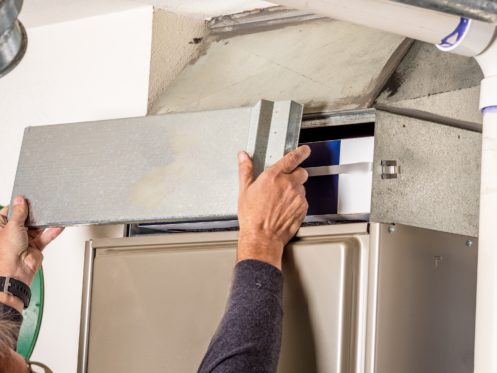
If you run a furnace in your home to stay warm during the winter months, there are many aspects of maintenance that you’ll need to keep up with. One of the most important is changing out its air filter regularly. If you’re new to this task, it’s easy to become overwhelmed with how many different types of filters are on the market today.
HEPA FILTERS
One of the most commonly talked about furnace filters is the HEPA filter. These filters are responsible for capturing up to 99% of all airborne contaminants that are .3 microns or larger. This makes them great for eliminating indoor pollutants and creating a healthier environment for your family. However, HEPA filters tend to be the most expensive and can restrict airflow for your furnace due to their high filtering capability. They are most commonly used in hospitals and other commercial buildings.
FIBERGLASS FILTERS
One of the cheapest filters that you’ll find on the market is the fiberglass or synthetic filter. This disposable filter will catch up to 80% of airborne particles that are 50 microns or bigger in size and will catch up to 25% of airborne particles that are between 3 and 10 microns in size. These filters are great for preventing dust and dirt build-up inside of your furnace, and they allow maximum airflow throughout your ventilation system. However, fiberglass filters only offer a basic level of air filtration for your home.
POLYESTER FILTERS
Polyester filters are a step up from your traditional fiberglass filter. This filter traps between 80 and 95% of particles that are 5 microns or larger. Due to its higher filtering capability, polyester filters tend to run about four times the cost of the average fiberglass or synthetic filter.
PLEATED FILTERS
One of the most commonly purchased furnace filter types is the pleated filter. This design has pleated sections that offer greater surface area than other filters. This disposable furnace filter is typically made of woven cotton or polyester. It offers more filtering capability than both polyester and fiberglass filters due to the way it’s constructed. You can expect pleated filters to cost more than polyester filters.
ELECTROSTATIC FILTERS
A fairly newer type of furnace filter is the electrostatic filter. This type of filter uses fibers that become charged to attract airborne particles. Instead of the particles getting caught up in the filter itself, they’re attracted to the filter. These are available in both disposable and washable types. If you’re looking for a filter that has adequate filtering capability and is cost-effective, you may want to consider a washable electrostatic filter. Instead of replacing the filter every few months, you can simply pull it out and give it a good washing with soap and water to remove the unwanted airborne particle build-up.
CARBON FILTERS
A very effective filter for your furnace is a carbon filter. This type of filter utilizes carbon to trap unwanted gases in the air. The pollutant molecules will naturally attach to the carbon molecules as they become absorbed. The thicker the carbon filter that you purchase, the more time dirty air is going to spend inside of the filter. This means that more airborne particles are going to be filtered out by the time the air gets out of the filter. However, it’s essential to realize that the thicker the carbon filter is, the more restricted the airflow in your ventilation system will be.
A NOTE ON MERV RATINGS
MERV stands for minimum efficiency reporting value and is a measurement given to furnace filters by the American Society of Heating, Refrigerating, and Air-Conditioning Engineers (ASHRAE). This rating signifies a specific filter’s effectiveness at removing airborne particles and contaminants. MERV ratings go from 1 to 20, with 20 signifying the most effective filters.
A MERV rating between 1 and 4 is effective at removing pollen, dust, and dust mites. Fiberglass, polyester, and electrostatic filters fall into this rating category. A MERV rating of 5 to 12 will also remove mold spores, pet dander, and dusting aids. Pleated filters fall into this rating category. A MERV rating of 13 to 16, which most carbon filters fall into, will also remove bacteria, tobacco smoke, and sneeze droplets. A MERV rating of 17 to 20 will remove combustion smoke, carbon dust, and viruses. HEPA air filters fall into this MERV rating.
EXCEPTIONAL FURNACE SERVICES
Campbell Comfort Systems is here for all of your furnace needs in the West Deptford, NJ, area. We’re also available for all of your cooling, indoor air quality, ductless mini-split, and zoning system needs. Contact our office today to set up an appointment with one of our highly-skilled service technicians.

